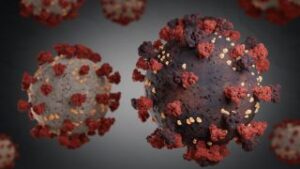As cases of the delta variant continue to raise concerns across the U.S. and a new variant reaches a warning level for the World Health Organization, many are wondering what variants are out there and which should we be concerned about?
According to the Centers for Disease Control and Prevention, variants of the coronavirus were expected.
“Viruses constantly change through mutation, and new variants of a virus are expected to occur,” the CDC’s website reads. “Sometimes new variants emerge and disappear. Other times, new variants persist. Numerous variants of the virus that causes COVID-19 are being tracked in the United States and globally during this pandemic.” Some variants seem to spread more easily and quickly than others, according to the CDC, which may lead to more cases of COVID-19.
Variants are categorized as “variants of interest,” “variants of concern” and “variants of high consequence.”
The CDC states that a variant is classified as a variant of interest if it shows “specific genetic markers that have been associated with changes to receptor binding, reduced neutralization by antibodies generated against previous infection or vaccination, reduced efficacy of treatments, potential diagnostic impact, or predicted increase in transmissibility or disease severity.”
“We will probably have a variant of what we call a variant of interest identified every few weeks,” Chicago Department of Public Health Commissioner Dr. Allison Arwady said Tuesday. “Like that’s how this virus works. Variants of interest just mean we’ve seen a number of the same genetic mutations emerge and scientists around the world are on the lookout for it every single time. A virus anywhere in the world gets this genetic sequence, it gets updated into a database that’s shared internationally, so we can really see what’s emerging. When a variant of interest emerges, it says, ‘Oh, this is something we should watch a little bit.'”
A variant of concern is one in which “there is evidence of an increase in transmissibility, more severe disease (e.g., increased hospitalizations or deaths), significant reduction in neutralization by antibodies generated during previous infection or vaccination, reduced effectiveness of treatments or vaccines, or diagnostic detection failures,” according to the CDC.
“Once we see a variant of interest clearly have an impact, meaning it is more contagious, it might be evading a treatment, it’s clearly making people sicker – that makes it into a variant of concern,” Arwady said.
Finally, a variant of high consequence “has clear evidence that prevention measures or medical countermeasures have significantly reduced effectiveness relative to previously circulating variants.” Or, as Chicago’s top doctor put it, a variant in which “the vaccine was not working very well.”
Currently there are no variants of high consequence.
“I would say if something became a variant of high consequence that would be a big deal,” Arwady said, adding that such variants are ones in which “the vaccine was not working very well.”
So which variants are being tracked so far? Here’s what we know:
In the U.S. and around the globe, there are currently four variants labeled “variants of concern” by the CDC and the World Health Organization.
Alpha Variant
Also known as B.1.1.7, the alpha variant was first identified in the United Kingdom and quickly spread to the most prevalent variant in the US, before the delta variant took hold.
The alpha variant “spreads much faster than other variants” and “may potentially cause more people to get sicker and to die,” according to the CDC.
Vaccines currently being administered in the U.S. work against this variant, though some breakthrough cases have been reported. The vaccines do however continue to prove effective against severe illness, hospitalization and death, the CDC reports.
Beta Variant
Also known as B.1.315, the beta variant was first identified in South Africa.
The beta variant “may spread faster than other variants” but current data has shown no sign the variant causes “more severe illness or death than other variants,” according to the CDC.
Vaccines currently being administered in the U.S. work against this variant, though some breakthrough cases have been reported. The vaccines do however continue to prove effective against severe illness, hospitalization and death, the CDC reports.
But when it comes to treating cases of this variant, certain monoclonal antibody treatments are less effective.
Gamma Variant
Also known as P.1, the gamma variant was first identified in Japan and Brazil.
While this variant does appear to spread faster than other, current data has shown no sign the variant causes “more severe illness or death than other variants,” according to the CDC.
Vaccines currently being administered in the U.S. work against this variant, though some breakthrough cases have been reported. The vaccines do however continue to prove effective against severe illness, hospitalization and death, the CDC reports.
But when it comes to treating cases of this variant, certain monoclonal antibody treatments are less effective.
Delta Variant
Also known as B.1.617.2, the delta variant was first identified in India and is now the responsible for most COVID cases in the U.S.
The delta variant “spreads much faster than other variants” and “may cause more severe cases than other variants,” according to the CDC.
Delta’s speed and high transmissibility makes it able to “pick off the more vulnerable more efficiently than previous variants,” Dr. Mike Ryan, executive director of the WHO’s health emergencies program, said during a news conference on June 21.
The delta variant “poses a particular threat to our young people,” White House coronavirus response coordinator Jeff Zients said at a press briefing last month.
How do vaccines work against this variant?
“Infections happen in only a small proportion of people who are fully vaccinated, even with the delta variant,” the CDC states. ”Some breakthrough infections are expected, but remain rare. However, preliminary evidence suggests that fully vaccinated people who do become infected with the Delta variant can spread the virus to others.”
When it comes to treating cases of this variant, certain monoclonal antibody treatments are less effective.
There’s also been some discussion about a so-called “delta plus” variant.
Arwady clarified that the “delta plus” variant is a sub-type of the delta variant known formally as AY.1. Three sub-types have so far been labeled AY.1, which some have informally called “delta plus,” as well as AY.2 and AY.3.
“There have been a handful of cases, but not even 1% of cases, either here in the Midwest area or in the U.S. have been identified as that AY.1,” Arwady said.
Arwady said that among the sub-types of the delta variant, the original delta variant B.1.617.2 “outcompetes” the others because it is more contagious.
What other variants are being monitored?
In addition to the four variants of concern, there are also a number of “variants of interest.”
According to WHO, variants of interest include Eta, Iota, Kappa, Lambda and, most recently Mu.
Eta Variant
First identified in the United Kingdom and Nigeria, the Eta variant is being monitored for its potential to reduce the effectiveness of some monoclonal antibody treatments, according to the CDC. So far, cases have not been identified in the U.S.
Iota Variant
The Iota variant was first identified in New York. It is being watched for “reduced susceptibility to the combination of bamlanivimab and etesevimab monoclonal antibody treatment,” though it’s not clear what impact that would have as alternative monoclonal antibody treatments are available.
Lambda Variant
The lambda variant is not listed as a variant of interest by the CDC, but it is listed by WHO.
So far, the “variant of interest” has been detected in 29 countries, and it may spread more quickly than milder versions of the coronavirus.
Also known as C.37, the variant has been spreading rapidly in South America, particularly in Peru, where the earliest documented samples of the virus were detected in December 2020.
In its report in mid-June, the WHO reported that “lambda has been associated with substantive rates of community transmission in multiple countries, with rising prevalence over time concurrent with increased Covid-19 incidence” and that more investigations would be carried out into the variant.
Mu
Most recently, Mu — also known by scientists as B.1.621 — was added to the WHO’s list of variants “of interest,” the international health organization said in its weekly COVID epidemiological report published late Tuesday.
The variant contains genetic mutations that indicate natural immunity, current vaccines or monoclonal antibody treatments may not work as well against it as they do against the original ancestral virus, the WHO said. The mu strain needs further study to confirm whether it will prove to be more contagious, more deadly or more resistant to current vaccines and treatments.
Other Variants
Other variants of interest identified by the CDC include: B.1.617.3, first identified in India and B.1.429 and B.1.427, both identified out of California.




